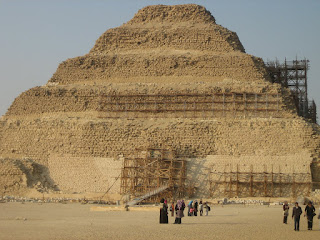On Thursday morning we woke up to the hotel phone ring which woke everyone up at 5:30, so we can be early enough (7:30am) in line for the Hufu Pyramid, 1Km from the hotel.
There is no individual responsibility on this trip, perhaps logical in a group of 32,
though people in our group seem well traveled and organized. Anyway, we did make it on time to that particular ticket line - they only sell 150 tickets each morning.
We had a funny incident in the ticket line: Einat & Yuval's student cards were "of the wrong kind" and ineligible for the 50 pound discount (a regular ticket costs 100 pounds). But the cashier gave them student tickets nonetheless, and 50 pounds change accompanied with a huge wink and smirk when Avi handed him 400 pounds - we cheated the government together and split the difference. So this is our first step down the slippery slope of the criminal's life in Egypt...
It is very hard to describe the effect of the pyramids. When you stand next to them, they don't look as big as they are supposed to. When you compare them to anything nearby (eg a person) you get a better sense, but it is still misleading. The two things which seem to give a better perspective are looking at them from a distance - they don't seem to get smaller, and dominate the view. The other thing was climbing into one, as we did in Hufu's, the largest pyramid, built some 4600 years ago. In some pyramids the burial place is underground, in some at ground level, and in some, Like Hufu's up in the middle of it. So you climb a long (about 100 meters), narrow, dark and rather airless path inside this huge structure, realize that it is not hollow, but full of "bricks", each about 2.5 tons, with over 2.3 millions of them. You further see much better than from the outside the extreme precision of how they are laid next and above each other. I'd say it was awesome, but as the day progressed I realized that I should use this word cautiously - I'll need it again and again.

After viewing the 3 great Giza pyramids (and the many small ones, there are about 100 in this area) from various directions we went to see the solar boat. No, it is not solar-powered, but rather the boat which is supposed to carry the dead Pharaoh when he resurrects in the underground river, similar to the way mythology explains how the sun, after setting in the West, moves at night in that underground river back to the East. This huge and really beautiful boat was reconstructed recently from a kit left there 4.5 millenia ago which contained the complete materials and complete instructions - IKEA style.

The sphinx... Another amazing view. There seems to be a plan to restore its nose (which was used as target practice by Ottoman artillery) - we debated the pros and cons of this plan - no resolution, but as nobody asked us that's ok.

We stopped for lunch at a very touristy place, so some of us opted out and lunched on fresh pitas we bought from the pita bakers - delicious!

Then to the Sakkara - burial Mastabas (the precursors of pyramids) of priests and noblemen.
You go into one and immediately feel amazement at the quality of art created so long ago, at the remarkable level of preservation, as well as sorrow knowing that it will all deteriorate
very soon as there are no efforts made at all to protect and preserve it. The art is wall reliefs with remarkable detail and beauty, depicting mainly the wealth of the dead person, decorated with all kinds of fish, birds and land animals, and scenes from daily life, like milking and sacrificing cows, force-feeding geese, etc. It was all in color too, with some paint remaining. And they cram hordes of tourists into these tiny rooms which, even if they control their natural tendency to touch these reliefs are forced to lean or brush them when pushed by other tourists. What a shame.
Finally, we went to see the tomb of Josser, from around 2800 BC. He had an architect who
invented so many things we are used to call by other names. The pyramids started with him (accidentally, building one mastaba on top of another, nicknamed the "steps pyramid"),
Greek columns (Ionic and Doric) have started here, where his columns represented a bunch of reeds tied together. And probably more things I forgot. Very impressive!

Back to the hotel buffet - nothing to write home about. (There was a tourist trap stop on the way in a gift store - we are afraid the cut the local guide and driver got from this stop was nil - everybody was tired and not interested in shopping at all.) Then a lecture by Danny on the history of Egypt, fascinating in detail and very long - some people (like us) started losing him and fading away.
























